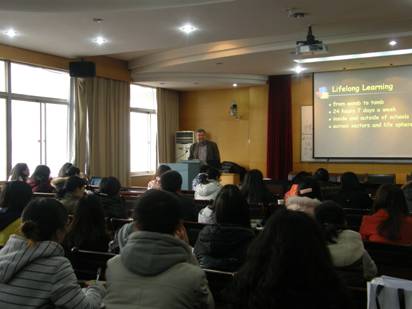
Date: 2012-03-27 Visitcount: 1455
On March 20th, at the invitation of the Department of Education, College of Education, Zhejiang University, world-famous lifelong education expert, the chair of ESREA (European Society for Research in the Education of Adults) and the former vice president of Roskilde University, Professor Henning Salling Olesen delivered a lecture titled Lifelong learning policy: rethinking education and training institutions in the Tian Jiabing lecture room. The lecture was chaired by Professor Xueping Wu, Head of the Education Department, and more than seventy teachers and students of the Education Department participated in the lecture.
 |
Professor Olsen explained the reason why he selected the topic Lifelong Learning Policy. From his point of view, globalization of education is now deeply changing the world’s education development agenda. Some common trends and problems have become global education issues like lifelong learning.
He elaborated this topic from four aspects. Firstly, he introduced the meaning of lifelong learning, which exists from womb to tomb, occupies 24 hours 7 days a week, inside and outside of schools, and happens across all sectors and life spheres. Secondly, he analyzed the critical factors in implementing LLL policies and took the EU as an example to describe the characteristics and content of international LLL policy. He pointed out that the EU’s LLL policy focused on implementation processes and social inclusion dimensions. Its objectives are social inclusion, active citizenship, personal fulfillment, employability, skills, and human resources. In the EU’s view of lifelong learning, it happens not only in schools, but also in family, community, the work place, in libraries and on the internet. It aims not only at the acquisition of knowledge, but also the competences needed in modern societies like literacy, collaboration and communication, work identity, self confidence and commitment, sense of quality, care for others, and care for the environment. Education should not be changeless, but requires new pedagogical work methods, holistic learning environments, career guidance as well as recognition of non-formal and informal learning. The role of teachers is not only teaching, but also as learning supporters and classroom leaders. Thirdly, he took Denmark as a case to discuss government’s LLL policy and practice. He indicated Denmark has a well-developed public education and training system for all, a complete qualification framework accessible for all. According to the EU’s lifelong learning indicators, Denmark leads in adult learning, literacy and economic equality. Finally, he summarized and proposed some initiatives of national education reforms, including recognizing real competences, developing praxis-based and problem-oriented curriculum and new study formats.
Professor Olsen’s lecture was substantial in content and easy to understand, which further deepened students’ understanding of LLL policy. After the lecture, Professor Olsen engaged in further discussion with the audience on some issues related to how to recognize non-formal and informal learning, the relation between international organization and LLL policy and so on.
Recorded by Ph.D. student Li Wei
March.20th, 2012

